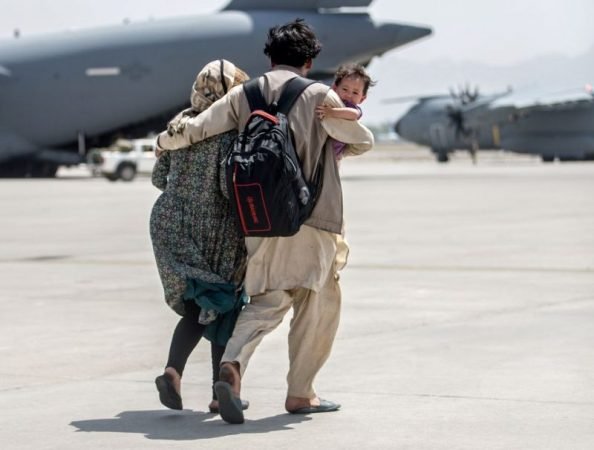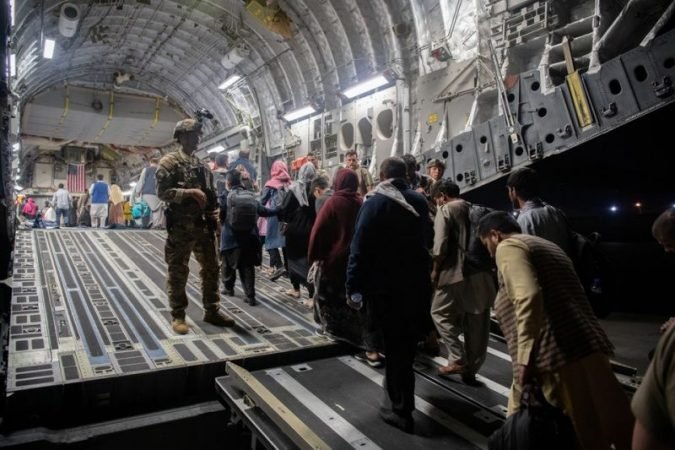G7 to meet on Afghan deadline, evacuation put on ‘war footing’

U.S. President Joe Biden is set to come under pressure at a G7 meeting on Tuesday to seek more time to evacuate thousands of people hoping to flee from Afghanistan as fears grow that time for the massive operation is running out.
Widespread chaos punctuated by sporadic violence has gripped Kabul’s airport since the Taliban took over the Afghan capital on Aug. 15, with Western and Afghan forces driving back crowds desperate to flee.
Evacuations were being conducted on a “war footing” as foreign forces try to meet a Aug. 31 deadline agreed earlier with the Taliban for the withdrawal of all foreign forces, a NATO diplomat told Reuters.
Thousands of Afghans have returned to their homes after learning that situation was “relatively calm” in provinces across the country, said the diplomat, who asked not to be identified, while cautioning that scant intelligence and security reports were coming in from remote districts.
U.S. President Joe Biden, who has said U.S. troops might stay beyond the deadline, has warned the evacuation was going to be “hard and painful” and much could still go wrong.
Democratic U.S. Representative Adam Schiff, chairman of the House of Representatives Intelligence Committee, told reporters after a briefing on Afghanistan by intelligence officials that he did not believe the evacuation could be completed in the eight remaining days.
“I think it’s possible but I think it’s very unlikely given the number of Americans who still need to be evacuated,” Schiff said.
A Taliban official said on Monday an extension would not be granted, though he said foreign forces had not sought one. Washington said negotiations were continuing.

‘Does it still hurt? Yes’
Many Afghans fear reprisals and a return to a harsh version of Islamic law that the Taliban enforced while in power from 1996 to 2001, including repression of women.
There have been isolated but numerous incidents of Taliban aggression and intolerance reported on social media, as well as reports of Taliban searches for old enemies, fanning those fears.
Australia evacuated more than 50 female Afghan Paralympians, athletes and their dependents after securing visas for them, the Australian Broadcasting Corp reported on Tuesday.
Leaders of the United States, Britain, Italy, France, Germany, Canada, and Japan who meet virtually later on Tuesday may use the possibility of unified official recognition, or renewed sanctions to push the Taliban to comply with pledges to respect women’s rights and international relations.
“The G7 leaders will agree to coordinate on if, or when to recognise the Taliban,” said one European diplomat. “And they will commit to continue to work closely together.”
Leaders of the Taliban, who have sought to show a more moderate face since capturing Kabul, have begun talks on forming a government, that have included discussions with some leaders of old governments including a former president, Hamid Karzai.
Recognition of a Taliban-led Afghan government by other countries would have important consequences, including allowing the Taliban access to the foreign aid that previous Afghan governments have depended upon.
Biden will face pressure from other leaders to extend the Aug. 31 deadline for evacuations. France has said more time was needed, and German Foreign Minister Heiko Maas said on Monday the G7 needed to consider whether to remain beyond that date.
Biden has faced widespread criticism over the withdrawal, which was initiated by his Republican predecessor, Donald Trump, under a deal struck with the Taliban, and his opinion poll ratings have slipped.
For its part, the powerful U.S. military has been grappling with the collapse of U.S.-backed Afghan forces after 20 years of training. “Was it worth it? Yes. Does it still hurt? Yes,” General David Berger, the commandant of the Marine Corps, wrote in a memo to Marines.
Reporting by Reuters bureaus; Writing by Lincoln Feast; Editing by Simon Cameron-Moore



















